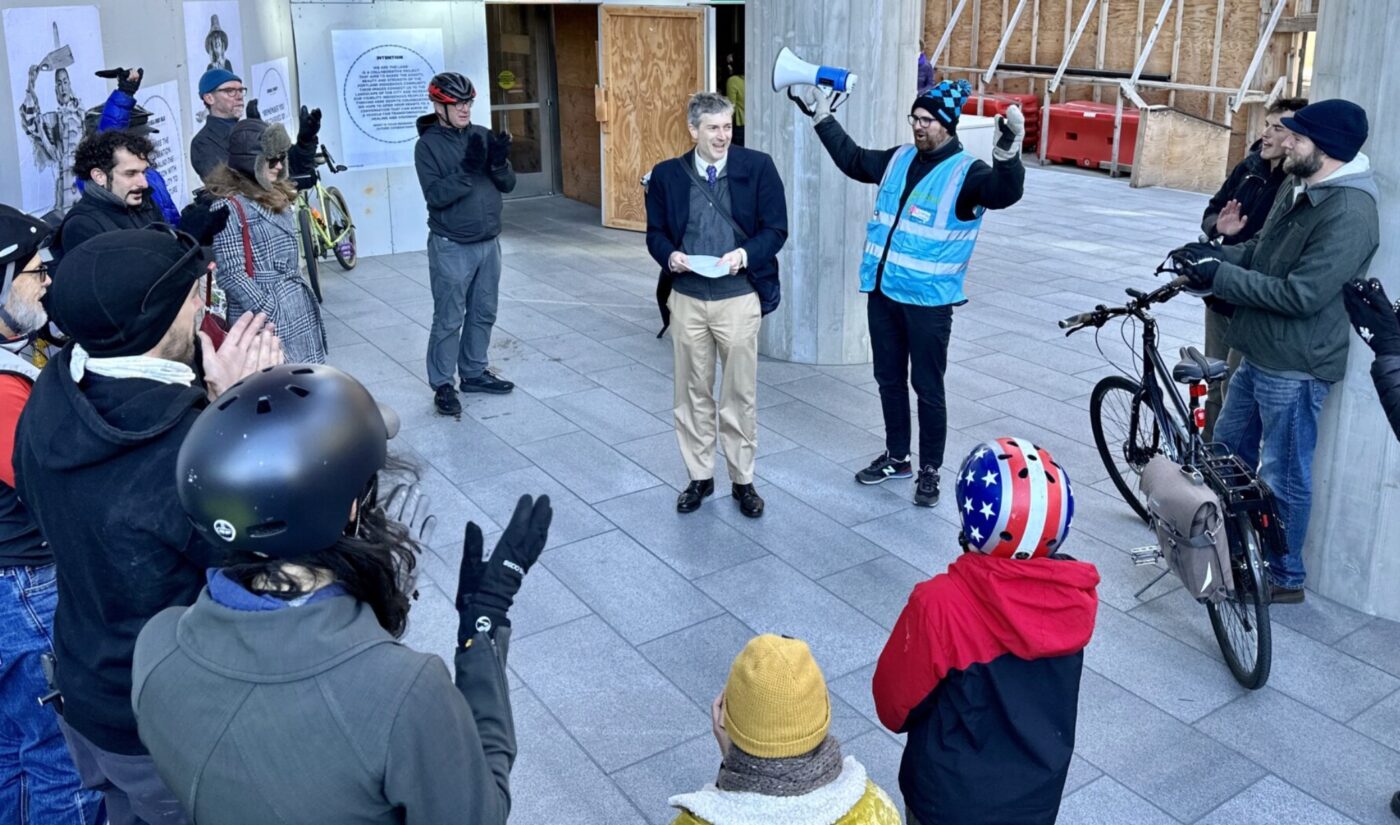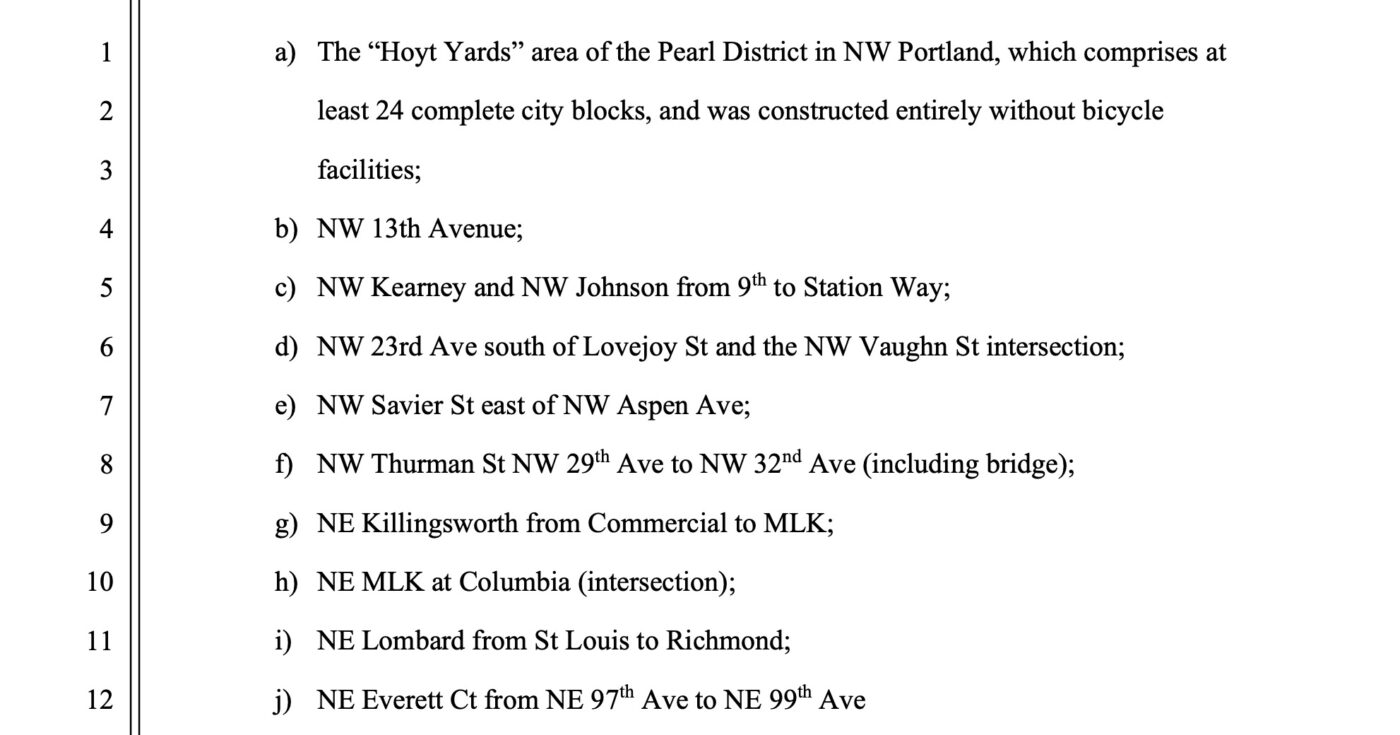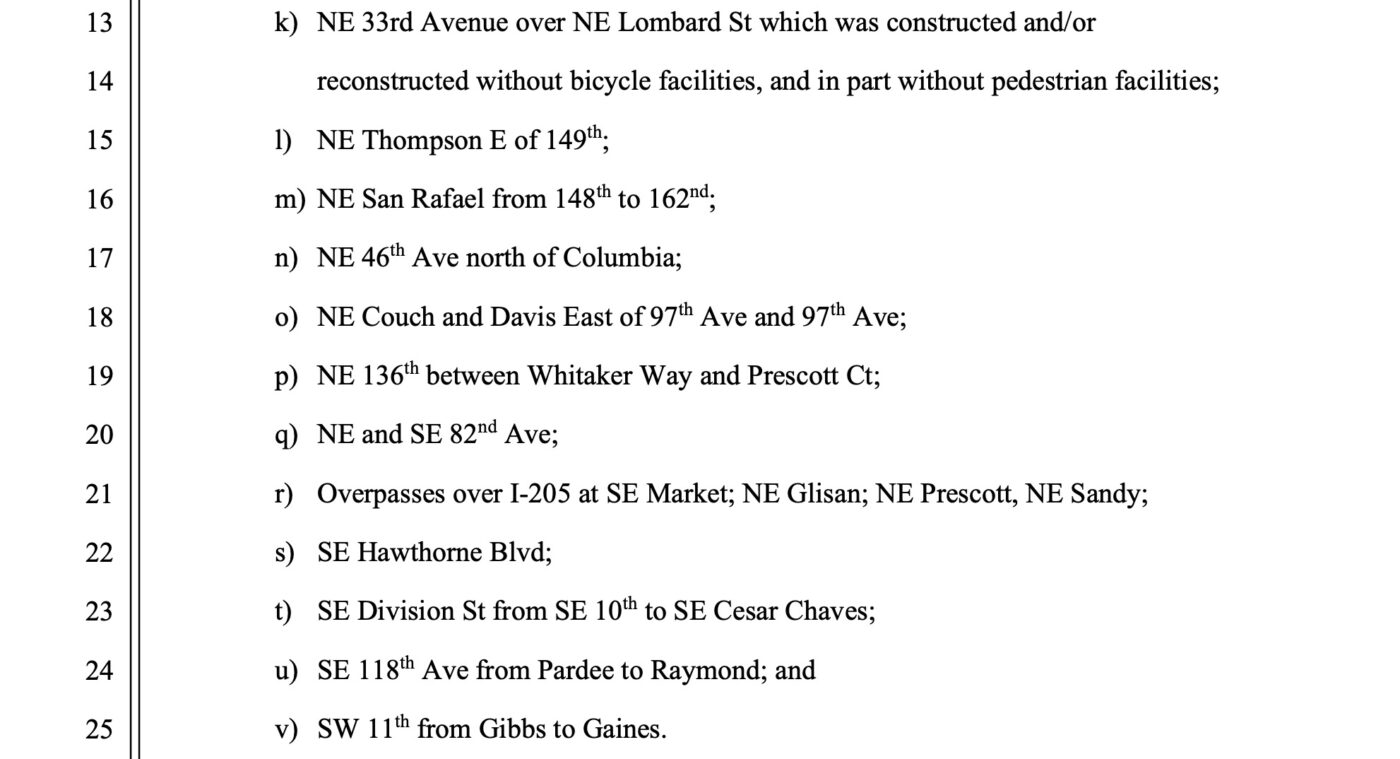
“This is a significant win.”
– BikeLoud PDX
A lawsuit that would force the City of Portland to build bikeways in accordance with the 1971 Oregon Bike Bill was heard in court today. And while the judge granted the City’s motion to dismiss, he also left the door wide open for advocates to refile the suit.
Circuit Court Judge Christopher Ramras heard arguments from lawyers on both sides of the case in a phone conference this morning. Lawyer Jim Coon with Portland-based firm Thomas, Coon, Newton & Frost* made the arguments for BikeLoud PDX, the nonprofit group that filed the suit back in November; and Deputy City Attorney Daniel Simon spoke for the City of Portland.
As we’ve reported, the suit alleges that the City of Portland has failed to meet obligations to build bikeways as outlined in ORS 366.154 (aka “the Bike Bill”). Their complaint has outlined 22 specific projects citywide (see below) where the Portland Bureau of Transportation has completed significant road projects but has not built bike infrastructure along with them.
The City of Portland filed a motion to dismiss the case on two main grounds: that BikeLoud doesn’t have legal standing to bring the lawsuit and that the statute itself is nonjusticiable, meaning that the court should not be put into the position of enforcing the law. The City argued that since the law pertains to the State Highway Bill, the Oregon Department of Transportation is the agency that should enforce it. The City also believes that the Bike Bill does not create a “private right of action” — a legal term that says private citizens can bring a claim to courts to protect their rights under the law.


At the outset of today’s hearing, Judge Ramras implied that he believes the Bike Bill does trigger a private right of action, but he questioned whether or not the plaintiffs (members of BikeLoud PDX) have the required legal standing to force the City’s hand.
Portland City Attorney Dan Simon was first to present his case. “Enforcement of the bill is statutorily given to the State Highway Fund and the plaintiff’s response doesn’t address that,” Simon contended. “It just says that, ‘Well, if ODOT didn’t do their job properly, that that doesn’t excuse the city.’ The problem with that argument is that what the plaintiffs are seeking in this case is essentially that the court become the arbiter of what the bike bill says and how the city implements it.” Simon wanted to make the point that the court should not tell the City of Portland what to do. He went on to explain that the Bike Bill has several exceptions where bikeways are not required to be built. “And so, BikeLoud’s claims are are essentially asking the court to substitute its own judgment for the city’s planners in that regard.”
Simon also argued that BikeLoud is too general of an interest to bring a lawsuit in the first place. Referencing BikeLoud’s own complaint filing, Simon said, “They claim generally that BikeLoud members are unable to safely and efficiently use numerous city streets because they are not complying with the Bike Bill. That is a pretty general and abstract [legal] interest.” Simon’s contention is that BikeLoud members are not distinct from other road users and therefore, “There’s no special injury [legal term for harm] affecting BikeLoud’s members differently than other citizens.”
On those grounds, Simon asked Judge Ramras to dismiss the case “with prejudice” which would mean that the plaintiff could not refile the same claim with the court.
Lawyer Jim Coon then spoke to rebut Simon’s argument.
“There’s no special injury [legal term for harm] affecting BikeLoud’s members differently than other citizens.”
– Daniel Simon, Deputy City Attorney
“We absolutely contest that,” Coon said, referencing Simon’s argument that ODOT has exclusive power to enforce the Bike Bill. “It says nothing about who enforces the bike bill in [ORS] 366,” Coon continued. “It certainly does not, as defendant claims in its brief, expressly grant to the state the power to enforce the bill.” Then Coon pointed out that ODOT themselves must follow the Bike Bill law. “So who enforces the statute against the department transportation?”
Coon also rejected Simon’s argument that the court is powerless to compel the City to act. “The court certainly has the power to say what the law is and then enforce it and tell the City what it needs to do… The idea that this court is going to be managing how the City complies with the Bike Bill has no support,” Coon said. He went on to explain that the City has long partnered with advocacy groups and other people and organizations in deciding how to design and build bike projects. “The court would not be sitting there saying, ‘Okay, we’re going to separate a bike lane here, do a bike box there… We wouldn’t ask the court to do that. The court doesn’t have expertise to do that… The City has the expertise. Our problem is they’ve done nothing at these 22 sites.”
“We certainly have standing to bring [the lawsuit]. If not us, who was going to do it?”
– Jim Coon, Thomas, Coon, Newton & Frost
As for why BikeLoud has a distinct interest as a plaintiff and is not the just a general road user, Coon said, “That’s just not true. We’re not just road users. We’re people on bicycles are out there mixing with traffic every day.” Coon pointed out that around 6% of Portlanders ride bikes on a regular basis as per the U.S. Census. “That is a legally recognized interest, and the Bike Bill says you’re supposed to do this stuff, and we’re saying they haven’t. That’s a question of fact.”
“We certainly have standing to bring [the lawsuit]. If not us, who was going to do it?” he said.
In the end, Judge Ramras granted the City’s motion to dismiss; but did so “without prejudice” which means BikeLoud and their lawyers can refile the same claim after making some changes. In explaining his rationale, Ramras said, “I don’t believe plaintiffs have standing to bring their action for injunctive relief.” The judge based his argument on Foote v. State of Oregon, a 2019 case where the Oregon Supreme Court ruled that the District Attorney and a group of crime victims who brought the suit did not have a “legally recognized” interest. “The law [they wanted to change] affected them no differently than it affected any other citizen,” Judge Ramras explained. “And I believe the same is true here. I think there are plenty of citizens who ride bikes who probably have an interest in having safe biking conditions, but do not belong to BikeLoud.”
Portland Lawyer Scott Kocher, who also represents BikeLoud PDX and is working with Coon on the case, said after today’s decision, “I don’t see this as a loss or a win, it’s really kind of punting the issue.” Kocher said all Ramras has done is to point out a “missing piece” to the case. That is, a plaintiff with a more concrete and particularized harm (legally-speaking). Furthermore, Kocher said he feels that Judge Ramras has jettisoned the City’s main argument that ODOT has exclusive authority to enforce the Bike Bill. “If the Judge agreed with that,” Kocher shared. “He would have dismissed the case with prejudice.” Kocher says they also learned today that the court disagrees with the other part of the City’s argument; that there is no “private right of action” under the Bike Bill.
In a statement released a few minutes ago, BikeLoud said: “Today the trial court directed BikeLoud to resubmit our Bike Bill lawsuit with additional details. We will be working with our attorney to meet the judge’s requirements. BikeLoud believes we will be able to make a compelling case that we have an interest in enforcing the bike bill, as the judge requires. We are pleased that the judge rejected the City’s argument that only ODOT has the ability to enforce the Bike Bill. This is a significant win. The City was hoping the judge would dismiss the lawsuit with prejudice which would not allow us to resubmit.”
(*Thomas, Coon, Newton & Frost is a BikePortland advertiser, but that relationship had no impact on this story.)


